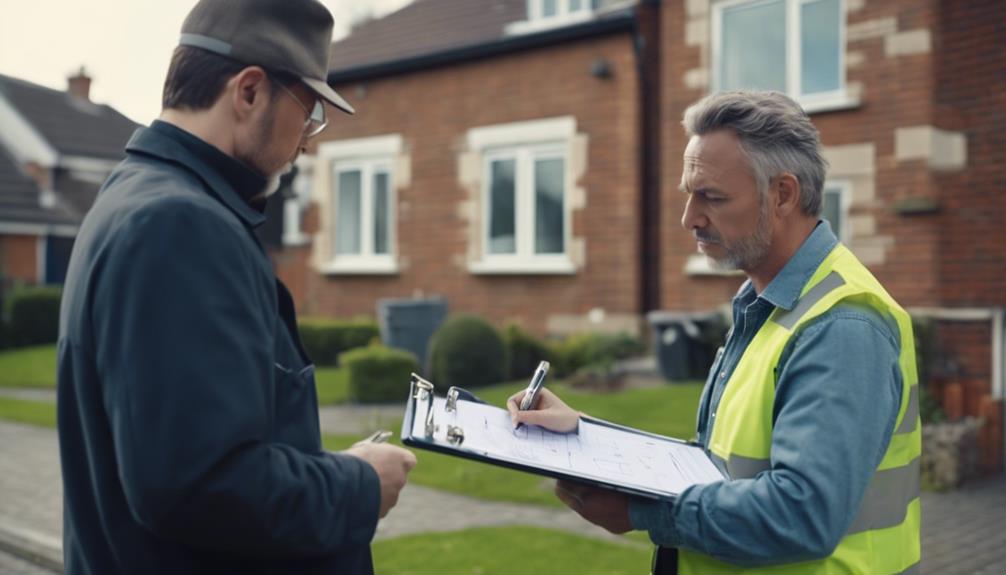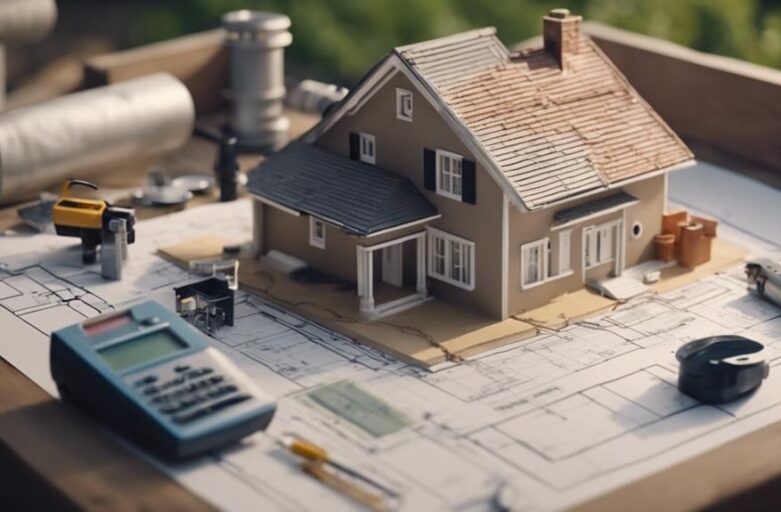When it's time to check a house, always remember to have your important tools with you. These include knee pads, a tool bag, and a special camera called a FLIR C2. This camera helps you find issues that are not easily seen. Other smart tools are infrared cameras and moisture meters, they can help you spot problems that are hard to see. If you want to check the safety of the electrical system, use GFCI and AFCI combo testers.
The most important thing is to talk clearly and honestly with the people who own the house. Give them a detailed report of what you found, answer their questions, and help them understand how much it might cost to fix any problems. Remember, the more you learn about how to inspect a house properly, the better you will be at your job.
Key Takeaways
- Begin your check by equipping yourself with useful tools like knee protectors, a gear bag, and special gadgets like a device to measure wetness.
- Take advantage of modern tech like heat-detecting cameras to find hidden issues in the building and possible water damage.
- Pay attention to electrical safety using testers during your check.
- Make sure you look at the chimney for any cracks and to ensure air is moving through it correctly.
- Wrap up by writing a simple report that includes proof, clear explanations, and any costs that might be needed to fix problems.
Essential Inspection Equipment
If you're planning to inspect a property, there are five must-have tools to help you do a good and safe job.
Firstly, knee pads are very important. They may not seem like much, but they can protect you from getting hurt while you're crawling around during the inspection. You want to be doing your job, not nursing a sore knee!
Secondly, you need a basic tool bag. This bag should have a flashlight for dark places, a screwdriver for opening electrical panels, and a voltage tester to check if things are working properly.
Thirdly, there's this cool piece of tech called a FLIR C2 camera. This camera isn't just for show – it helps you spot hidden problems like poor insulation or water leaks. Think of it as your very own x-ray vision!
Lastly, a Hydro Shark moisture meter is a tool you don't want to miss out on. This handy device can help you find potential water damage, saving you time and money in the long run.
Effective Inspection Techniques
Ready with your inspection gear, let's dive into some effective ways to check out a property. Remember, you're not just looking at a house; you're making sure it's safe for someone to live in.
Infrared cameras are like your hidden-issue detectors. They can see changes in temperature that might mean there's a problem with the structure of the house. Using them means you won't miss any hidden problems.
Moisture meters are like your water damage shields. They can find wet spots that you can't see, helping you locate leaks. Finding these leaks now can stop big problems later on.
GFCI and AFCI combo testers are your electrical safety protectors. They check that all the wiring is safe and up to rules set by the authorities.
Next, you need to look at the chimney. Check for any cracks and make sure air can flow through it properly. This helps keep the house safe and warm.
When you find anything wrong, make sure to write it down in the inspection report. Include detailed explanations and pictures or videos. This evidence shows exactly what condition the house is in. You're not just making a report; you're making a quality checkpoint.
Client Interaction and Communication

As a Certified Home Inspector, your job is more than just looking at houses. You're also a guide helping people make a big decision about buying a house.
One important part of your job is talking to your clients clearly and openly. This can help them understand what's going on with the house and fix any problems on the spot. It also means there's less chance of them coming back to you with questions after the inspection.
You should invite your clients to come along during the inspection. Seeing problems with their own eyes can help them understand better and trust you more.
Make sure to give them a full report on any issues you find with the house. Try to explain everything in simple words they can understand. This helps them feel included and understand the house better.
Be ready to answer any questions they have. They mightn't know as much about houses as you do, so they'll be thankful for your patience and knowledge. Tell them about any issues, how much it might cost to fix them, and any tips you have for looking after the house or saving energy. This can help them feel more valued and respected.
Conclusion
Ending on a high note, remember how critical it is to carry out proper inspections on properties. Pack your toolkit with all the necessary tools, get really good at inspecting, and make sure you talk and listen to your clients well.
Bear in mind, you're not just checking out a house; you're protecting someone's dream and their money they invested. So, be really excited about your job. Work on your abilities and always provide the best service.
Your dedication to doing a great job won't only keep properties safe but also make your clients trust you. Your hard work really matters.


